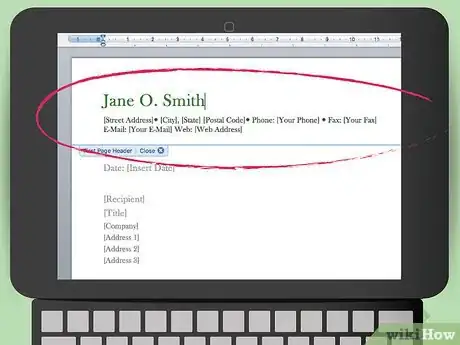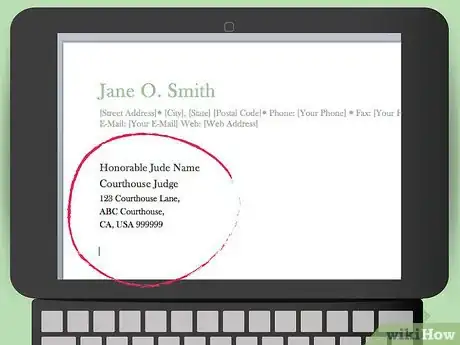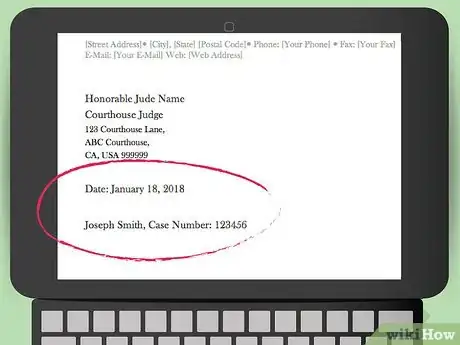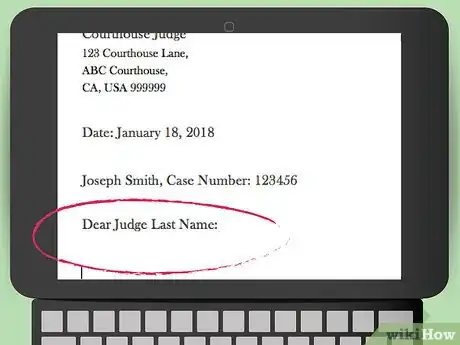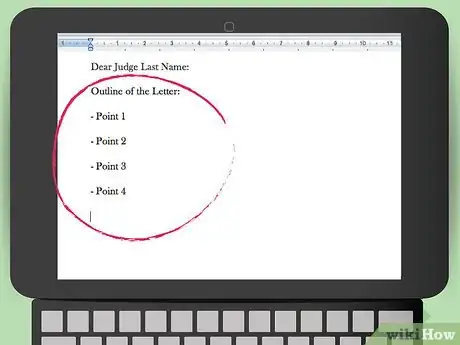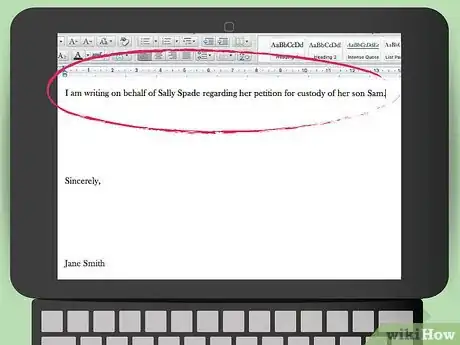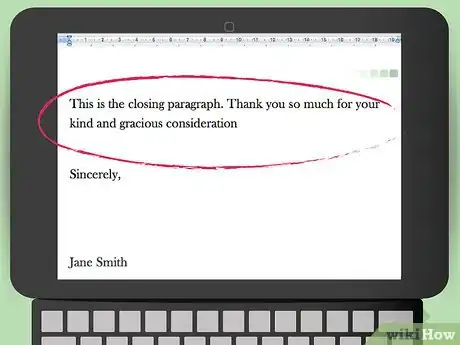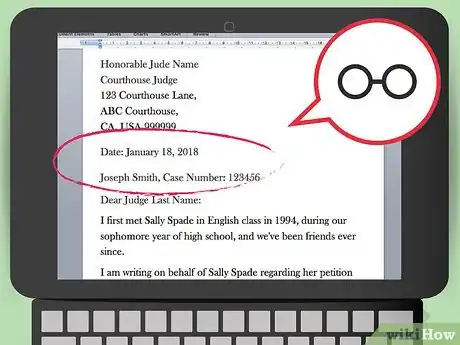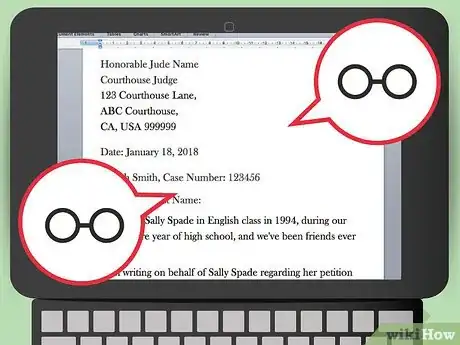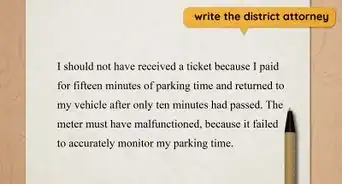This article was written by Jennifer Mueller, JD. Jennifer Mueller is an in-house legal expert at wikiHow. Jennifer reviews, fact-checks, and evaluates wikiHow's legal content to ensure thoroughness and accuracy. She received her JD from Indiana University Maurer School of Law in 2006.
There are 7 references cited in this article, which can be found at the bottom of the page.
This article has been viewed 34,765 times.
Superior Courts are state courts that have general jurisdiction over both civil and criminal cases. Given the wide variety of cases superior court judges hear, there are numerous reasons you might need to write a letter to a superior court judge. Most often, letters to judges are character letters written on behalf of a parent during a custody proceeding, or on behalf of a defendant prior to sentencing. Although the reasons for writing the letter may vary widely, the basic format for the letter itself is the same.
Steps
Formatting Your Letter
-
1Use letterhead if possible. If you have letterhead available, it can make your letter look more professional and official.
- If you don't have prepared letterhead, most computer word processing applications have letterhead templates which can make your letter look more polished and professional.
-
2Address the letter. Following the traditional format for a business letter, your letter should include your name and address as well as the judge's name and the address of the court.[1]
- Your word processing application may have a template you can use for business letter format. If you're not using a template, type your name on one line, then type your address on the following lines as though you were writing it on an envelope. When you've typed it, use the formatting options to move the entire block over to the top right-hand corner of the page.[2]
- Make a double space after your address, then write the judge's name and the address of the court on the left-hand side of the page. Type the address using two or three lines, just as you did your own address.[3]
- Use the correct title when writing the judge's name. Typically you can address the letter as "Judge [Full Name]" or "Honorable [Full Name]."
Advertisement -
3Provide a date and subject line. Use the date you plan to send the letter, rather than the date you are writing your first draft.
- Your subject line should refer to the individual for whom you're writing the letter as well as the case name and file number. If you don't have that information, you can ask the person for whom you're writing the letter, or copy the caption from a document filed in the case.
-
4Enter your salutation. Use the judge's proper name and title to address your letter, rather than using a generic salutation such as "To Whom It May Concern."
-
5Create your signature block. Leave space for the body of your letter, then include a closing such as "Sincerely," or "Respectfully yours," with space for your signature.
- Leave at least four lines for your signature, then type your name below that space.[8] You also may wish to include your phone number or email address below your name. There's no need to include your address, as you put that information at the top of your letter.
- If your job title or place of work is important to the letter or the reason you were chosen to write the letter, you might want to include that under your name.
Drafting Your Letter
-
1Create an outline. Making a list of the points you want to make or the things you want to say before you start writing your letter can help keep your writing focused and organized.
- If the person for whom you're writing the letter is represented by an attorney, you may want to meet briefly with the attorney to discuss what you plan to include in your letter. Make sure the information you want to include will actually be of benefit.
- You also may find it helpful to brainstorm before you decide what you want to focus on in your letter. Think of positive character traits, then find examples or anecdotes that demonstrate those traits. For example, if you intend to show that the person about whom you're writing is honest, you might relate a story where the person found a wallet with cash and went out of her way to find and return it intact to its owner.
- You might want to think of three or four overarching points you want to make, and then organize any other information or anecdotes about the person within those points. This will keep your letter organized.
- If you're writing a letter on behalf of a criminal defendant, you may want to mention certain character traits about that person and provide examples. For example, you may know the defendant to be a loyal friend and family member.[9]
- If you're writing a letter on behalf of a parent involved in a custody case, avoid making disparaging or insulting statements about the other parent. Keep your focus on the person for whom you're writing the letter and their relationship with their child.
- Your points should flow from your relationship to the person and the knowledge you naturally would have. For example, if you are co-workers, it's appropriate to include the fact that the person is hard working. However, if you're just a friend or neighbor, you may not have enough knowledge to back that statement up – even if you believe it strongly.
-
2Introduce yourself. At the beginning of your letter, tell the judge who you are and your relationship to the person for whom you're writing the letter.
- If you have strong feelings for the person, you should include a statement to that effect. This includes not only love, but also respect or friendship.[10]
- Additionally, you should mention how long you've known the person if that isn't made clear by your relationship. For example, if you've been the defendant's friend for 10 years, the judge probably will give your opinion more weight than if you've only known him for three months – but the judge won't know unless you tell him.
- If relevant, include dates and locations to indicate how long you've known the person.[11] For example, you might write "I first met Sally Spade in English class in 1994, during our sophomore year of high school, and we've been friends ever since." You don't have to write a biography of your relationship, but relating key dates and events will reinforce how important the person is to you.
- If your job title or education lends more weight to your opinion or is related to the subject of the letter, you should include that as well. In some situations, this information may have relevance because you are a co-worker of the person for whom you're writing the letter.
- If you're writing a character letter for a parent involved in a custody dispute, you also should include your relationship to the child, especially if you worked with the child outside of the home, for example as a teacher or coach.
-
3State the purpose of your letter. Tell the judge why you're writing the letter, and include a brief summary of what you intend to show through your letter.
- If you're writing your letter on behalf of a party in the case, state that fact clearly.[12] For example, you might write "I am writing on behalf of Sally Spade regarding her petition for custody of her son Sam."
- If you're writing a letter in support of a criminal defendant, you should include a statement indicating that you understand the crime with which the defendant has been convicted. If you are able to help the person in any way, such as by providing him or her a place to live or a job, you should include that information as well.[13]
-
4Write the body of your letter. The body of your letter should include several paragraphs, with each paragraph addressing a single topic of discussion or point you want to make.
- The body of your letter should be single-spaced, with a double-space between each paragraph.[14]
- Regardless of the purpose of your letter, include specific examples for every statement you make.[15] The judge won't necessarily be impressed if you simply say that you believe the person is trustworthy. However, if you provide an example of his or her trustworthiness, your words will carry more weight.
- If you're writing on behalf of a convicted defendant, include any knowledge or understanding you have of the defendant's family, and how they will be affected by his sentence.[16]
- Keep the tone of your letter friendly and conversational. Don't worry about using legal terms – just write in your own words.[17]
- The best examples to use are everyday occurrences.[18] The judge wants to know how the person for whom you're writing the letter acts in ordinary circumstances, not in situations that are rare or outside the norm.
- Provide as many specific details in your anecdotes as possible. If your example relates to something that happened repeatedly, let the judge know. For example, you might write "Sally was the biggest supporter of Sam's baseball team, arriving an hour early to help the coach and keeping score on many occasions."
- If you're referring to a single, specific event, include as much detail as you can, including dates and locations.[19] These details make your story more believable, which will help your letter carry more weight.
-
5Include a closing paragraph. While it doesn't have to be long or elaborate, you should close your letter with a couple of sentences thanking the judge for his or her time and consideration.[20]
- If you're asking the judge to do something in particular, include that statement in your closing as well. For example, if you're requesting leniency on behalf of a defendant in a criminal case, you might include a statement to that effect along with a brief statement as to why you believe this best serves justice or society at large.[21]
Finalizing Your Letter
-
1Read and edit your letter. In addition to making sure your letter reads smoothly and makes sense, you want to make sure it says what you want it to say.
- A good way to check the flow of your writing is to read your letter aloud. This will force you to slow down rather than skim, and you'll hear when something doesn't sound right.
-
2Proofread your letter carefully. Even if you used a word-processing application with an auto-correct function, it may not pick up every error.[22]
- Although you should run your letter through a grammar and spelling check, they won't pick up some types of errors. For example, if you type "hear" when you meant "here," the spell-check function won't alert you to that error, because "hear" is itself a word.
-
3Consider having someone else read your letter. A friend or family member may be able to point out parts of your letter that are confusing or don't flow well.
- Be open to critique from anyone else who reads your letter. Since you know what you intend to say, you will tend to read your words in that light. However, someone else may read your words to say something very different. If your reader doesn't understand or get your point, it's likely the judge won't get it either.
-
4Print and sign your letter. When you print your letter, use plain white or ivory paper of a traditional size – the longer legal size of paper is no longer common in courts and will cause complications with filing.
- Sign your letter using blue or black ink, and make copies of your signed letter for your own records before you send it.
- In some circumstances, the court may require your letter to be notarized. The person for whom you're writing the letter, or her attorney, should be able to tell you whether this step is necessary.
- If you have the letter notarized, this means you'll sign it before a notary public. The notary will check your identification and sign the letter as well to verify that it was you who signed it.[23]
-
5Send your letter to the judge. Mail your original signed letter to the address you were given for the judge.
- Depending on your reasons for writing the letter, an attorney may want to read it before you send it, or may want to send it themselves. For example, if you're writing a character letter on behalf of the defendant after conviction of a crime but prior to sentencing, his or her attorney may want to review the letter to make sure the content adequately supports the defendant's cause.[24]
Warnings
- If you are a party to a case, you should never write a letter directly to the judge. Court rules prohibit parties from communicating with the judge without the other side's knowledge. If you want to tell the judge something about your case, you must file a motion or other document with the court and send it to the other side first.[25]⧼thumbs_response⧽
References
- ↑ http://www.prisonerswithchildren.org/pubs/ipm/ltj.htm
- ↑ http://www.prisonerswithchildren.org/pubs/ipm/ltj.htm
- ↑ http://www.prisonerswithchildren.org/pubs/ipm/ltj.htm
- ↑ http://www.brodenmickelsen.com/blog/character-letter-of-support-to-judge/
- ↑ http://thelawdictionary.org/article/best-way-to-write-a-professional-letter-to-a-judge/
- ↑ http://thelawdictionary.org/article/writing-a-letter-to-the-judge-before-sentencing/
- ↑ http://thelawdictionary.org/article/writing-a-letter-to-the-judge-before-sentencing/
- ↑ http://thelawdictionary.org/article/best-way-to-write-a-professional-letter-to-a-judge/
- ↑ http://www.brodenmickelsen.com/blog/character-letter-of-support-to-judge/
- ↑ http://www.brodenmickelsen.com/blog/character-letter-of-support-to-judge/
- ↑ http://www.goldengateimmigration.com/archives/797
- ↑ http://thelawdictionary.org/article/best-way-to-write-a-professional-letter-to-a-judge/
- ↑ http://www.brodenmickelsen.com/blog/character-letter-of-support-to-judge/
- ↑ http://thelawdictionary.org/article/best-way-to-write-a-professional-letter-to-a-judge/
- ↑ http://thelawdictionary.org/article/writing-a-letter-to-the-judge-before-sentencing/
- ↑ http://thelawdictionary.org/article/best-way-to-write-a-professional-letter-to-a-judge/
- ↑ http://thelawdictionary.org/article/how-to-write-a-character-reference-for-child-custody/
- ↑ http://thelawdictionary.org/article/how-to-write-a-character-reference-for-child-custody/
- ↑ http://www.goldengateimmigration.com/archives/797
- ↑ http://thelawdictionary.org/article/writing-a-letter-to-the-judge-before-sentencing/
- ↑ http://www.brodenmickelsen.com/blog/character-letter-of-support-to-judge/
- ↑ http://thelawdictionary.org/article/best-way-to-write-a-professional-letter-to-a-judge/
- ↑ http://www.goldengateimmigration.com/archives/797
- ↑ http://www.brodenmickelsen.com/blog/character-letter-of-support-to-judge/
- ↑ http://www.courts.state.hi.us/self-help/exparte/ex_parte_contact.html
